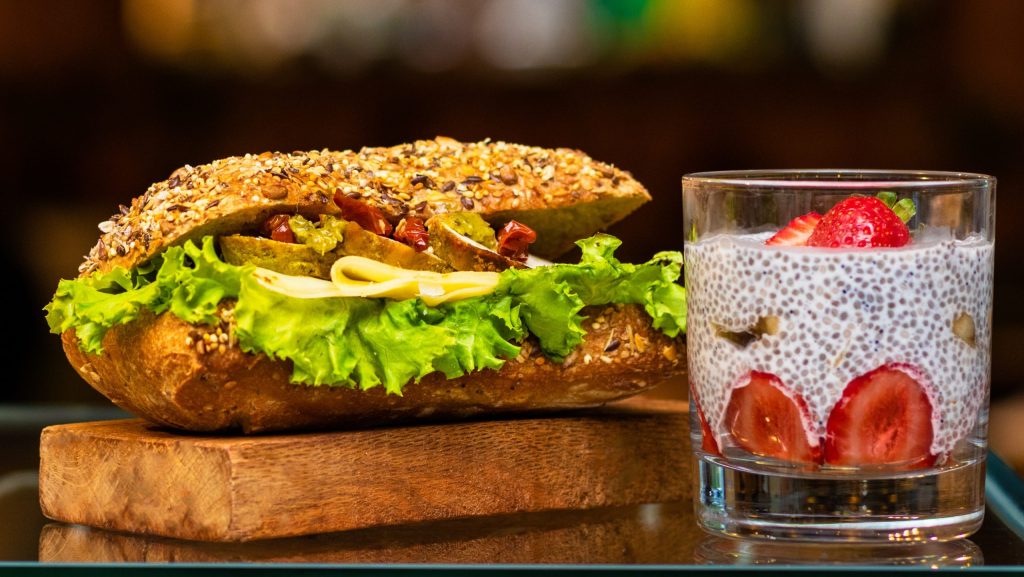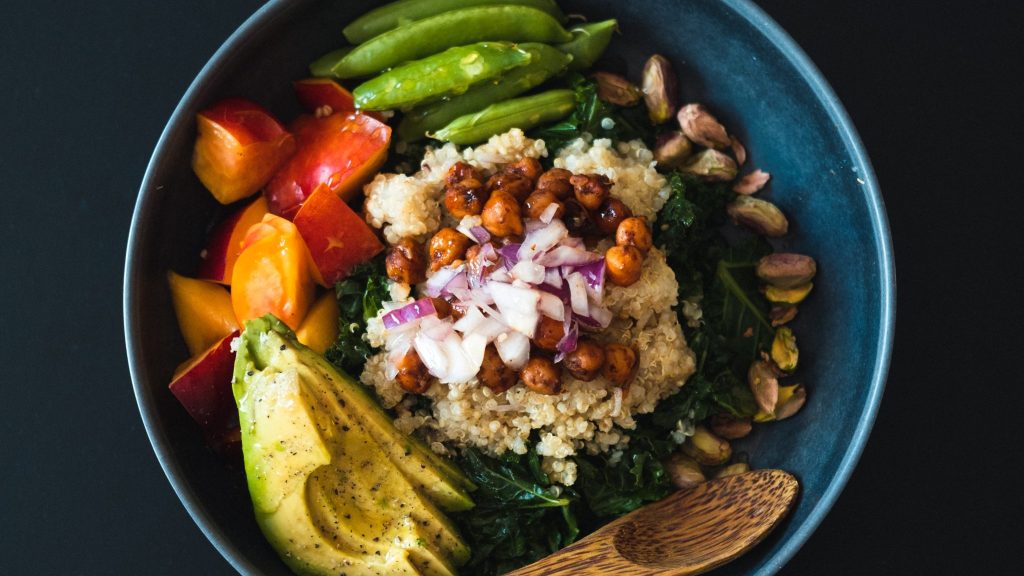As fitness enthusiasts, bodybuilders, and gym-goers, you already know the hard work doesn’t end when you rack your weights. What you eat after your workout is crucial in determining how effectively your muscles repair, rebuild, and grow. This isn’t just about protein shakes and chicken breasts; it’s about understanding the symphony of nutrients that play a pivotal role in muscle recovery and growth.
“What you eat after your workout is as important as the workout itself.”
In this comprehensive guide, we’ll dive deep into the science and art of post-workout nutrition. We’ll explore why certain foods are your allies in the quest for muscle building, how they work with your body’s recovery processes, and most importantly, how you can incorporate them into delicious, effective post-workout meals. Whether you’re a seasoned lifter, a weekend warrior, or someone just starting on their fitness journey, this article is your roadmap to optimizing your post-workout nutrition for maximum muscle gain and efficient recovery.
Proteins – The Building Blocks
When it comes to muscle recovery and growth, protein is your powerhouse nutrient. Post-exercise, your muscles are primed for repair and growth, and it’s protein that steps in to facilitate this process. Protein’s role in muscle protein synthesis is crucial – it’s the very process that repairs the micro-tears in muscle fibers caused by intense workouts, leading to muscle growth and strength gains.
Diversity of Protein: Types and Benefits
In the realm of proteins, diversity is key. Proteins are categorized as complete or incomplete based on their amino acid profile. Complete proteins, typically found in animal sources like chicken, fish, eggs, and dairy, provide all the essential amino acids your body needs. Plant-based proteins, found in foods like legumes, quinoa, and tofu, are often incomplete but can form a complete amino acid profile when combined correctly.
Among the popular proteins in fitness circles are whey, casein, and soy. Whey protein is celebrated for its rapid absorption, making it an excellent choice for post-workout recovery. Casein, with its slower digestion rate, is ideal for sustained protein release, beneficial throughout the day or before bedtime.
📌Tip: Combine different protein sources in your meals to enjoy the benefits of both rapid and sustained protein absorption!
Protein Intake: Quantity Meets Quality
It’s not just about how much protein you consume, but also the quality. A general guideline for post-workout protein intake is 0.14-0.23 grams per pound of body weight. However, this can vary based on factors like workout intensity and personal fitness goals. Be cautious of overconsumption, as excessive protein can strain your body, particularly your kidneys.
The ‘anabolic window’ concept suggests a period post-workout when your muscles are most receptive to nutrients. Aim to consume protein within 30 to 60 minutes post-exercise to maximize muscle repair. However, recent studies indicate a more extended window, offering greater flexibility. Remember, protein works best in synergy with other nutrients. A balanced post-workout meal includes carbohydrates for glycogen replenishment and fats for essential fatty acids and nutrient absorption.
💡Did You Know? Recent research suggests that the anabolic window for protein consumption could extend beyond the traditionally believed 30-60 minutes post-workout, offering more flexibility in your nutrition timing.
Practical Meal Ideas for Optimal Recovery
Incorporating protein into your post-workout routine can be both simple and delicious. Here are some easy meal ideas:
- Grilled chicken breast, quinoa, and steamed veggies.
- Protein smoothie with whey, banana, and almond milk.
- Scrambled eggs with spinach on whole-grain toast.
- Tofu stir-fry with veggies and brown rice, or a chickpea salad for plant-based options.
In conclusion, the journey to muscle recovery and growth is significantly influenced by your protein intake. By understanding the types of protein, their digestion rates, and how they work in conjunction with other nutrients, you can tailor your post-workout meals to support your fitness goals effectively.

Carbohydrates – The Energy Replenishers
Carbohydrates are vital in replenishing the glycogen stores depleted during exercise, directly impacting muscle recovery and your overall energy levels. Understanding the types of carbohydrates and their timing is key to effective post-workout nutrition.
Carbohydrates can be broadly categorized into simple and complex. Simple carbs, found in sugars, provide quick energy but may lead to rapid blood sugar fluctuations. Complex carbs, present in whole grains and starchy vegetables, offer a more sustained energy release, beneficial for muscle recovery and consistent energy levels.
When selecting carbs for your post-workout meal, opt for complex carbohydrates for their slow-release energy and nutritional benefits. Excellent choices include whole grains like quinoa or brown rice, and starchy vegetables like sweet potatoes.
Optimal Carbohydrate Intake: A Balanced Approach
Aiming for about 0.5-0.7 grams of carbohydrates per pound of body weight within 30 minutes to two hours post-exercise is generally recommended. This should be balanced with your overall dietary goals, especially if you’re monitoring blood sugar levels or adhering to specific diets.
📌Tip: Incorporate a variety of carbohydrate sources in your diet to benefit from different nutrients and maintain balanced blood sugar levels.
Table: Recommended Carbohydrate Sources Post-Workout
| Carbohydrate Source | Type | Benefits |
|---|---|---|
| Quinoa | Complex | High in protein, fiber, and minerals |
| Brown Rice | Complex | Rich in fiber and B-vitamins |
| Sweet Potatoes | Complex | High in vitamins A and C |
| Bananas | Simple | Quick energy, rich in potassium |
| Berries | Simple | Antioxidants, low glycemic index |
Carbs and Protein: A Synergistic Duo for Recovery
Combining carbs with protein post-workout is essential. This pairing not only boosts muscle protein synthesis but also aids in more efficient glycogen replenishment. A balanced meal that includes both macronutrients is key to enhanced recovery and preparedness for your next workout.
Consuming carbohydrates within the 30 minutes to two-hour window post-exercise maximizes glycogen replenishment. This period is crucial for effective recovery, and contrary to common myths, consuming carbs during this time is unlikely to lead to weight gain if balanced within your overall nutritional intake.
💡Did You Know? Consuming a mix of simple and complex carbohydrates post-workout can provide both immediate and sustained energy for muscle recovery.
Practical Meal Ideas: Combining Carbs for Recovery
Incorporating a mix of carbohydrates into your post-workout meals can be simple and delicious. Consider these ideas:
- A smoothie with banana, whey protein, and oats.
- Quinoa salad with grilled chicken and vegetables.
- Whole-grain toast with almond butter and sliced banana.
- Baked sweet potato with a side of grilled fish or tofu.
Carbohydrates are not merely energy sources; they are crucial components of a holistic approach to muscle recovery and overall wellness. By understanding the types of carbohydrates and their optimal timing, you can tailor your post-workout nutrition to support your fitness and health goals effectively.

Fats – The Misunderstood Nutrient
Fats, often mistakenly seen as the enemy in fitness, are in fact vital for muscle recovery and overall health. They play a significant role in hormonal balance, essential for synthesizing muscle-building hormones like testosterone. Let’s debunk the myths and understand how fats contribute positively to your fitness journey.
Understanding the different types of dietary fats is crucial for making informed dietary choices. Saturated fats, found in animal products and certain oils, are important in moderation for overall health. Unsaturated fats, including monounsaturated (like those in avocados and olive oil) and polyunsaturated fats (found in nuts and seeds), are celebrated for their heart-health benefits. Conversely, trans fats, typically present in processed foods, are best avoided due to their negative health impacts.
💡Did You Know? Monounsaturated fats, especially those found in olive oil, have been linked to reduced muscle soreness post-exercise, thanks to their anti-inflammatory properties.
Optimal Fat Intake: Striking the Right Balance
For active individuals, fat should not be shunned but rather strategically included in the diet. Approximately 20-35% of your daily calorie intake should come from fats, tailored to your fitness goals and dietary needs. Remember, the key is balance—ensuring that fat intake complements other macronutrients for optimal performance and health.
Integrating healthy fats into your post-workout nutrition can significantly enhance recovery. Foods like avocados, nuts, seeds, olive oil, and fatty fish not only provide essential fatty acids but also support overall well-being. These fats, when combined with a balanced meal, contribute to muscle growth and recovery.
Fats should be consumed as part of a balanced diet, especially post-workout. Combining healthy fats with proteins and carbohydrates ensures that your body receives a mix of essential nutrients. This holistic approach aids in muscle recovery, energy replenishment, and overall health maintenance.
Timing Your Fat Intake: Debunking Myths
The timing of fat intake around workouts has been a topic of debate. While fats are digested slower than other macronutrients, including some healthy fats in your post-workout meal is beneficial. It’s more about the quality and balance of fats rather than strict timing.
Adding healthy fats to your post-workout meals is both beneficial and delicious. Consider these ideas:
- Sprinkle nuts or seeds on your post-workout yogurt or salad.
- Use avocado as a healthy fat in sandwiches or wraps.
- Opt for a piece of salmon or mackerel, rich in omega-3 fatty acids, alongside your carbs and veggies.
Embracing fats as an integral part of your diet can transform your recovery process and overall fitness outcomes. By understanding and incorporating healthy fats, you enhance your post-workout nutrition, supporting muscle growth and holistic health.

Timing Matters – When to Eat After Workout
The concept of the anabolic window is central to post-workout nutrition. This period, typically within 30 to 60 minutes post-exercise, is when your muscles are most receptive to nutrients. Consuming a mix of proteins and carbohydrates during this time can significantly enhance muscle recovery.
Immediate vs. Delayed Nutrient Intake: A Comparative Overview
Immediate nutrient intake, within this anabolic window, leads to a faster replenishment of muscle glycogen and initiates muscle repair more effectively. In contrast, delaying nutrient intake can slow the recovery process and may impact muscle growth over time.
For immediate recovery, focus on foods that are quick to digest and rich in essential nutrients. These include:
- Quick-absorbing proteins like whey.
- Simple carbohydrates such as fruits or white bread with jam.
- Hydration fluids like water or electrolyte drinks.
Table: Ideal Post-Workout Foods
| Nutrient Type | Food Examples | Benefits |
|---|---|---|
| Protein | Whey protein, Greek yogurt | Rapid muscle repair |
| Carbohydrates | Banana, white bread with jam | Quick glycogen replenishment |
| Hydration | Water, electrolyte drinks | Replenishes fluids, aids recovery |
Post-workout nutrition should be tailored to individual needs, considering factors like workout intensity, body type, and fitness goals. It’s essential to adapt nutrient timing to fit your unique requirements for effective long-term muscle recovery.
📌Tip: Keep a snack, like a protein bar or a piece of fruit, handy in your gym bag for immediate post-workout nutrition.
Balancing Immediate and Ongoing Recovery Needs: While the focus is often on the anabolic window, ongoing nutrition throughout the day is equally important. Ensure your meals contain a balanced mix of proteins, carbohydrates, and fats to support continuous muscle repair and growth.
Hydration: The Underrated Aspect of Recovery: Alongside solid foods, hydration plays a crucial role in effective recovery. Adequate water intake is essential for overall health and aids in the efficient absorption of nutrients post-workout.
Hydration and Muscle Recovery
Hydration is not just a supplement to your workout routine; it’s a cornerstone. Proper hydration plays a vital role in transporting nutrients to muscles and facilitating waste removal, directly impacting muscle recovery. Mild dehydration can severely hamper muscle recovery and reduce physical performance.
Electrolytes like sodium, potassium, and magnesium are crucial in maintaining fluid balance and supporting muscle function post-exercise. These minerals regulate muscle contractions, nerve function, and the body’s pH balance, playing a significant role in the recovery process.
💡Did You Know? Coconut water is a natural source of electrolytes, often considered a healthier alternative to commercial sports drinks due to its lower sugar content.
Tailoring Hydration to Your Workout
The amount and type of hydration needed can vary based on the intensity of your workout and environmental conditions. For example, high-intensity workouts or exercising in hot and humid conditions require more fluids and electrolytes to compensate for increased sweat loss. Likewise, endurance athletes have unique hydration needs that should be addressed to prevent dehydration and electrolyte imbalances.
Guidelines for Optimal Hydration
A general hydration guideline involves:
- Drinking 17-20 ounces of water two hours before exercise.
- Consuming 7-10 ounces of fluid every 10-20 minutes during exercise.
- Rehydrating post-workout with more fluids than what was lost in sweat.
Beyond water, consider incorporating electrolyte-rich drinks and hydrating foods into your diet. Sports drinks can be useful, especially for long-duration exercises, but be mindful of their sugar content. Including foods like cucumbers, strawberries, and watermelon can also contribute to overall hydration.
Staying Hydrated: Practical Everyday Tips
Maintaining optimal hydration can be seamlessly integrated into your daily routine:
- Keep a water bottle handy at all times.
- Include a glass of water with every meal.
- Incorporate hydrating foods into your diet.
- Use hydration tracking apps or set reminders to drink water throughout the day.
Adequate hydration enhances nutrient absorption, ensuring your body gets the maximum benefit from the foods you consume. This synergy between hydration, nutrition, and overall health is fundamental to achieving your fitness goals and ensuring effective muscle recovery.

Supplements vs. Whole Foods
In the search for optimal muscle recovery, the balance between supplements and whole foods plays a pivotal role. While each has distinct advantages, understanding how to harmonize their benefits is key to a well-rounded post-workout nutrition strategy.
- Supplements, like protein powders and BCAAs offer targeted nutrition that can be critical immediately after a workout. They provide a convenient way to get essential nutrients quickly, helping jumpstart the muscle recovery process. However, it’s crucial to recognize that supplements are just that—supplementary. They should not be the sole source of your post-workout nutrition.
- Whole foods, with their complex nutritional profiles, are irreplaceable in any diet. They provide not only the macronutrients needed for muscle repair but also a host of vitamins, minerals, and antioxidants that support overall health. The fiber in whole foods also aids in digestion and nutrient absorption.
Table: Supplements vs. Whole Foods for Post-Workout Recovery
| Aspect | Supplements | Whole Foods |
|---|---|---|
| Convenience | High | Varies |
| Nutrient Diversity | Targeted | Broad |
| Cost | Generally higher | Generally lower |
| Absorption Rate | Quick for some types | Slower, more gradual |
| Long-term Health | Supplemental | Fundamental |
The choice between supplements and whole foods often comes down to specific contexts and goals. Supplements can be more beneficial for immediate recovery needs or when specific nutrient targets are hard to meet through diet alone. Whole foods, on the other hand, are preferable for comprehensive nutrition and long-term health benefits. When integrating supplements into your diet, prioritize safety and quality. Choose reputable brands and be wary of products with unrealistic claims. Remember, supplements are not a substitute for a varied and balanced diet.
📌Tip: Consider a post-workout shake if you’re short on time, but plan a meal with whole foods for later to ensure a balanced intake.
Your post-workout nutrition should align with your individual needs and fitness goals. Whether leaning more towards supplements or whole foods, the key is to tailor your approach based on your workout intensity, dietary preferences, and overall health objectives.
Crafting the Ideal Post-Workout Meal
The art of post-workout nutrition lies in balancing the right mix of proteins, carbohydrates, and healthy fats. These components work together to repair muscles, replenish energy stores, and maintain overall health. Let’s delve into some diverse meal ideas that cater to different dietary needs and fitness goals.
🌱Protein is vital for muscle repair. Here are some versatile meal ideas:
- Meat Lovers’ Choice: Grilled chicken breast or salmon with quinoa and a side of mixed greens.
- Vegetarian Power Meal: A lentil and chickpea salad, tossed with a lemon-tahini dressing, complemented by a side of cottage cheese.
- Vegan Muscle Fuel: A tofu and vegetable stir-fry with tempeh, served over brown rice or quinoa.
⚡Carbohydrates are key to restoring energy. Some delicious carb-focused meals include:
- A hearty bowl of oatmeal topped with banana slices, a dollop of almond butter, and a drizzle of honey.
- A whole-grain wrap filled with grilled vegetables, hummus, and a sprinkle of feta cheese.
- Brown rice or sweet potato topped with black beans, avocado, and salsa for a flavorful mix.
📝Incorporate healthy fats for well-rounded nutrition:
- Add avocado to your chicken salad or salmon dish.
- Toss a salad with a dressing made of olive oil and balsamic vinegar.
- Snack on a handful of mixed nuts or seeds post-meal.
🕒Quick, Nutritious Meals for the Time-Strapped
- A protein-packed smoothie with Greek yogurt, mixed berries, and a scoop of protein powder.
- An avocado toast on whole-grain bread, topped with poached eggs.
- Pre-cooked quinoa mixed with canned tuna, cherry tomatoes, and cucumber for a rapid salad.
🔍Hydration: An Integral Part of Post-Workout Nutrition
- Blend a hydrating smoothie with cucumber, spinach, and pineapple.
- Sip on herbal teas or infusions that are refreshing and replenishing.
- Include water-rich fruits like oranges or grapefruits as a part of your meal.
🏋️Tailoring Meals to Your Goals
- For muscle building: Beef up portions, especially proteins and carbs.
- For weight management: Focus on lean proteins, fiber-rich veggies, and portion control.
- For endurance: Ensure a good balance of carbs for energy and protein for muscle repair.

Vegetarian and Vegan Options for Muscle Building
Building Muscle on a Plant-Based Diet and Gaining muscle as a vegetarian or vegan is entirely feasible with the right nutritional approach. By focusing on protein-rich foods and balancing other key nutrients, plant-based diets can support muscle growth effectively.
Protein is a critical component for muscle repair and growth, and plant-based diets offer a plethora of options:
- Top Plant Proteins: Legumes (lentils, chickpeas, beans), soy products (tofu, tempeh), and seitan stand out as excellent protein sources.
- Complete Proteins: Foods like quinoa and soy provide all essential amino acids. Combining different plant proteins (such as rice and beans) also achieves a complete amino acid profile.
In addition to protein, a well-rounded plant-based diet should include:
- Carbohydrates: Opt for whole grains and starchy vegetables for energy.
- Fats: Incorporate sources like avocados and nuts for overall health and nutrient absorption.
Table: Key Nutrients in Plant-Based Muscle Building
| Nutrient | Food Sources | Importance |
|---|---|---|
| Protein | Lentils, Tofu, Tempeh | Muscle repair and growth |
| Iron | Spinach, Fortified Cereals | Oxygen transport |
| Calcium | Fortified Plant Milks, Tofu | Bone health and function |
| Vitamin B12 | Supplements, Fortified Foods | Nerve function |
| Omega-3 | Flaxseeds, Walnuts | Joint health, inflammation |
Meal Prep and Planning for Success
Efficient meal preparation can make adhering to a plant-based diet much easier:
- Cook legumes and grains in bulk.
- Prepare versatile snacks like hummus and cut vegetables.
- Experiment with batch cooking plant-based stews and casseroles.
📌Tip: Use a variety of herbs and spices to add flavor and nutrients to your plant-based meals.
Customizing Your Plant-Based Diet
Adjust your diet based on your specific fitness goals:
- Muscle Gain: Increase your intake of protein and overall calories.
- Endurance Training: Focus on a balance of carbohydrates and protein.
- Weight Management: Emphasize fiber-rich foods and control portions.
Don’t Forget About Hydration
Hydration plays a crucial role, especially with a high-fiber diet:
- Regularly drink water throughout the day.
- Include hydrating fruits and vegetables in your meals.
Conclusion: Muscle Building Foods After Workout
As we sum up our topic of muscle-building foods post-workout, it’s evident that a strategic approach to nutrition is key. Let’s briefly revisit the core insights from each topic, integrating them into a cohesive narrative.
🔍 Proteins, Carbs, and Fats: We’ve seen the importance of proteins as the building blocks for muscle repair, the energy-restoring powers of carbohydrates, and the often-overlooked role of healthy fats in post-workout recovery. Each macronutrient plays a distinct and crucial role in supporting your body after a workout.
⏰ Timing and Hydration: The timing of your post-workout meal, particularly within the anabolic window, can significantly impact muscle recovery. Equally important is staying hydrated, as fluids are vital for overall muscle function and recovery.
🌱 Whole Foods vs. Supplements: We navigated the balance between whole foods and supplements, highlighting how each can fit into different aspects of post-workout nutrition based on individual needs and goals.
🥗 Meal Ideas and Dietary Preferences: From a variety of sample post-workout meals catering to different dietary preferences to specific considerations for vegetarians and vegans, we covered how to tailor post-workout nutrition for diverse lifestyles and objectives.
Wrapping It Up
In conclusion, your post-workout meals are a critical component of your fitness planning. A thoughtful blend of proteins, carbs, and fats, coupled with proper hydration and timing, can significantly enhance your muscle recovery and growth. Whether you opt for whole foods, supplements, or a combination of both, the goal is to align your nutrition with your personal health and fitness goals.
Citations
- Role of dietary protein in post-exercise muscle reconditioning – Luc J C van Loon (2013).
- Protein for exercise and recovery – Richard B Kreider et al. (2009).
- Dietary protein to support muscle hypertrophy – van Loon LJ, Gibala MJ (2011).
- Application of protein or protein hydrolysates to improve postexercise recovery – van Loon LJ (2007).
- International society of sports nutrition position stand: nutrient timing – Kerksick CM, Arent S, Schoenfeld BJ, et al. (2017).
- Is there a need for protein ingestion during exercise? – van Loon LJ (2014).
- Nutritional strategies to promote postexercise recovery – Beelen M, Burke LM, Gibala MJ, van Loon L JC (2010).
- Protein requirements for endurance athletes – Tarnopolsky M (2004).
- Restoration of Muscle Glycogen and Functional Capacity: Role of Post-Exercise Carbohydrate and Protein Co-Ingestion – Abdullah F Alghannam et al. (2018).
- Nutrition for post-exercise recovery – L M Burke (1997).
- Influence of Post-Exercise Carbohydrate-Protein Ingestion on Muscle Glycogen Metabolism in Recovery and Subsequent Running Exercise – Alghannam AF, Jedrzejewski D, Bilzon J, Thompson D, Tsintzas K, Betts JA (2016).
- International society of sports nutrition position stand: nutrient timing – Kerksick CM, Arent S, Schoenfeld BJ, et al. (2017).
- Glucose Plus Fructose Ingestion for Post-Exercise Recovery-Greater than the Sum of Its Parts? – Gonzalez JT, Fuchs CJ, Betts JA, van Loon LJ (2017).
- The use of carbohydrates during exercise as an ergogenic aid – Cermak NM, van Loon LJ (2013).
- Impact of Muscle Glycogen Availability on the Capacity for Repeated Exercise in Man – Alghannam AF, Jedrzejewski D, Tweddle MG, Gribble H, Bilzon J, Thompson D, Tsintzas K, Betts JA (2016).
- Acute or Short-term Effects of Whey Protein Alone or Along with Carbohydrate on Inflammation: A Systematic Review of Clinical Trials – Akbari A, Moazen M, Babajafari S, Abdollahzadeh SM, Ranjbar Zahedani M, Sasani N, Kazemi A (2023).
- “Effects of Protein Supplementation on Performance and Recovery in Resistance and Endurance Training” – Harry P. Cintineo et al. (2018).
- “International society of sports nutrition position stand: nutrient timing” – Chad M. Kerksick et al. (2017).
- “Beyond muscle hypertrophy: why dietary protein is important for endurance athletes” – Moore DR et al. (2014).
- “Protein intake during training sessions has no effect on performance and recovery during a strenuous training camp for elite cyclists” – Hansen M et al. (2016).
- “Multi-ingredient pre-workout supplements, safety implications, and performance outcomes: a brief review” – Harty PS et al. (2018).
- “Comparison of the effects of pea protein and whey protein on the metabolic profile of soccer athletes: a randomized, double-blind, crossover trial” – Loureiro LL et al. (2023).
- “Effect of Soy Protein Supplementation on Muscle Adaptations, Metabolic and Antioxidant Status, Hormonal Response, and Exercise Performance of Active Individuals and Athletes: A Systematic Review of Randomised Controlled Trials” – Zare R et al. (2023).
- “Effects of pre-sleep protein supplementation on plasma markers of muscle damage and inflammatory cytokines resulting from sprint interval training in trained swimmers” – Wu C et al. (2023).
- “Restoration of muscle glycogen and functional capacity: Role of post-exercise carbohydrate and protein co-ingestion” published in Nutrients.
- “Nutrition for post-exercise recovery” discussed in PubMed.
- “Factors influencing the restoration of fluid and electrolyte balance after exercise in the heat” from the British Journal of Sports Medicine.
- “Recovery from prolonged exercise: restoration of water and electrolyte balance” as featured in the Journal of Sports Sciences.
- “Fluid replacement and exercise stress. A brief review of studies on fluid replacement and some guidelines for the athlete” in Sports Medicine.
- “Low-fat, lactose-free and leucine-enriched chocolate cow milk prototype: A preliminary study on sensorial acceptability and gastrointestinal complaints following exhaustive exercise” from the Journal of the International Society of Sports Nutrition.
- “ISSN exercise & sports nutrition review update: research & recommendations” also from the Journal of the International Society of Sports Nutrition.
- “Effects of fasted vs fed-state exercise on performance and post-exercise metabolism: A systematic review and meta-analysis” from Scandinavian Journal of Medicine & Science in Sports.
- “Sports nutrition needs: before, during, and after exercise” published in Primary Care.
- “Workout Supplements” from Harvard T.H. Chan School of Public Health provides an overview of various post-workout supplements, including the role of carbohydrates and protein in muscle recovery.
- International society of sports nutrition position stand: nutrient timing – Chad M Kerksick et al. (2017).
- Nutrition for post-exercise recovery – L M Burke (1997).
- Influence of Post-Exercise Carbohydrate-Protein Ingestion on Muscle Glycogen Metabolism in Recovery and Subsequent Running Exercise – Abdullah F Alghannam et al. (2016).
- Glucose Plus Fructose Ingestion for Post-Exercise Recovery-Greater than the Sum of Its Parts? – Gonzalez JT, Fuchs CJ, Betts JA, van Loon LJ (2017).
- The use of carbohydrates during exercise as an ergogenic aid – Cermak NM, van Loon LJ (2013).
- Impact of Muscle Glycogen Availability on the Capacity for Repeated Exercise in Man – Abdullah F Alghannam et al. (2016).
- Acute or Short-term Effects of Whey Protein Alone or Along with Carbohydrate on Inflammation: A Systematic Review of Clinical Trials – Akbari A, Moazen M, Babajafari S, Abdollahzadeh SM, Ranjbar Zahedani M, Sasani N, Kazemi A (2023).
- Restoration of Muscle Glycogen and Functional Capacity: Role of Post-Exercise Carbohydrate and Protein Co-Ingestion – Abdullah F Alghannam et al. (2018).
- Hydration, Hyperthermia, Glycogen, and Recovery: Crucial Factors in Exercise Performance-A Systematic Review and Meta-Analysis – This study provides a systematic review and meta-analysis on the interrelationship between hydration, hyperthermia, glycogen levels, and recovery in the context of exercise performance.
- Hydration and physical performance – Bob Murray (2007).
- Rehydration strategies–balancing substrate, fluid, and electrolyte provision – Murray R. (1998).
- Fluid restriction during exercise in the heat reduces tolerance to progressive central hypovolaemia – Schlader ZJ, Gagnon D, Rivas E, Convertino VA, Crandall CG (2015).
- Thermoregulation during exercise in the heat: strategies for maintaining health and performance – Wendt D, van Loon LJ, Lichtenbelt WD (2007).
- Fluid and electrolyte supplementation for exercise heat stress – Sawka MN, Montain SJ (2000).
- Effects of thermal stress during rest and exercise in the paediatric population – Falk B (1998).
- Post-Exercise Rehydration in Athletes: Effects of Sodium and Carbohydrate in Commercial Hydration Beverages – Ly NQ, Hamstra-Wright KL, Horswill CA (2023).
- An Examination of Subjective and Objective Measures of Stress in Tactical Populations: A Scoping Review – Tramel W, Schram B, Canetti E, Orr R (2023).
- The effects of protein supplements on muscle mass, strength, and aerobic and anaerobic power in healthy adults: a systematic review – This study reviews the impact of protein supplements on muscle mass, strength, and power, highlighting when these supplements are most effective.
- Effects of protein in combination with carbohydrate supplements on acute or repeat endurance exercise performance: a systematic review – This article examines the combined effects of protein and carbohydrate supplements on endurance exercise performance.
- Effects of protein supplements on muscle damage, soreness and recovery of muscle function and physical performance: a systematic review – This review focuses on how protein supplements can affect muscle damage, recovery, and physical performance.
- The Effects of Dietary Protein Supplementation on Acute Changes in Muscle Protein Synthesis and Longer-Term Changes in Muscle Mass, Strength, and Aerobic Capacity in Response to Concurrent Resistance and Endurance Exercise in Healthy Adults: A Systematic Review – This systematic review explores the short-term and long-term effects of dietary protein supplementation on muscle synthesis, mass, strength, and aerobic capacity.
- Do multi-ingredient protein supplements augment resistance training-induced gains in skeletal muscle mass and strength? A systematic review and meta-analysis of 35 trials – This meta-analysis looks at the effectiveness of multi-ingredient protein supplements in augmenting muscle mass and strength gains from resistance training.
- Effects of protein supplementation in older adults undergoing resistance training: a systematic review and meta-analysis – This review and meta-analysis focus on the effects of protein supplementation in older adults engaged in resistance training.
- Post-Exercise Protein Intake May Reduce Time in Hypoglycemia Following Moderate-Intensity Continuous Exercise among Adults with Type 1 Diabetes – This study investigates the role of post-exercise protein intake in managing hypoglycemia among adults with Type 1 Diabetes.
- Dietary Intake of Protein and Essential Amino Acids for Sustainable Muscle Development in Elite Male Athletes – This article explores optimal protein and amino acid intake for muscle development in elite male athletes.